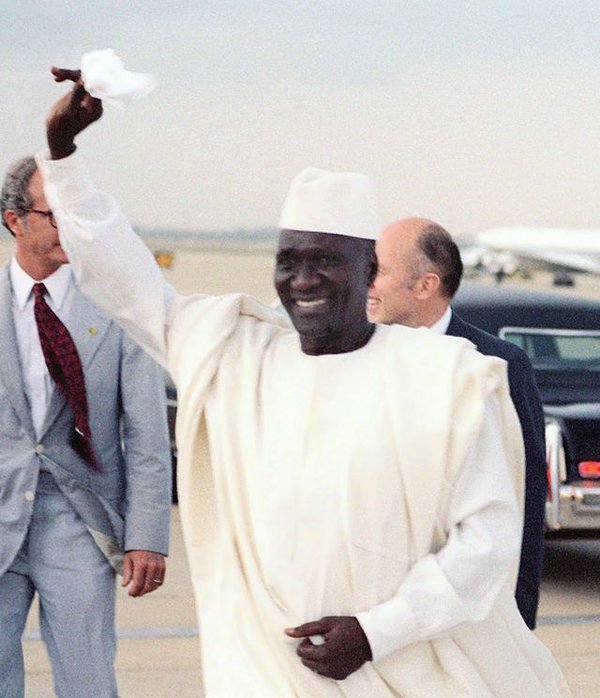 |
| Ahmed Sékou Touré |
Sékou Touré, a prominent West African politician and anticolonial agitator, became president of the Republic of Guinea in 1958 and ruled the country as a single-party state until his death in 1984.
Touré was born on January 9, 1922, in Faranah and was a member of the Malinke people. Touré came from humble family circumstances. He improved his nationalist credentials by claiming the well-known anti-French resistance figure Samory Touré as his grandfather.
Touré’s rise to power did not come through local social prominence and family connections but as the result of his success as a labor union organizer. His views were bitterly anticolonial, and complete independence from France was his desired goal.
To achieve such a result he needed a strong political organization to promote his ambitions, and the Guinean Democratic Party (RDA), founded in 1946, became this vehicle. Through this affiliation he also linked with other emerging African politicians, such as Félix Houphouet Boigny, a later president of the Ivory Coast. In 1952 Touré assumed the party leadership, and in 1956 he was elected to the French National Assembly.
Touré was committed throughout the 1950s to the drive for a total break from France, and he argued against any half measures such as partial independence under an associated Francophone union. This brought him into serious conflict with General Charles de Gaulle.
Touré took the total independence option on October 2, 1958, when he became Guinea’s president. France responded abruptly and harshly by ending all political and economic cooperation. Relations between France and the Republic of Guinea hardened, and eventually in 1965 all links were broken.
The strong stand taken by Guinea proved costly, although it fitted the anticolonial mood. It also forced Touré to look to other powers for aid and assistance. Given his early Marxist orientation and admiration for Vladimir Lenin, it was not surprising that he found a ready friend in the Soviet Union and its satellites. His country’s extensive bauxite reserves gave him a tool to maintain his position and attract international interest.
He was also keenly supported by Kwame Nkrumah of Ghana, who in 1957 led his country to independence from Great Britain. In 1978 Touré partially mended his political disagreements with France, and in that year President Valéry Giscard d’Estaing made a conciliatory gesture and visited Guinea.
Touré had for a time friendly relations with the United States, especially during the John F. Kennedy administration. By the late 1960s he feared Soviet intervention, but he was equally worried that U.S. involvement might undermine his regime.
This suspicion of outside interference was confirmed when Portuguese Guinea in 1970 unsuccessfully invaded Guinea. This act, some have argued, caused Touré to abandon democratic principles and impose a harsh one-man, one-party political system.
Although elections were held during this period, there was not a serious voice of opposition. Most other local political forces were either exiled or imprisoned. Touré abandoned some of his Marxist-Socialist roots in the late 1970s in an attempt to improve the country’s economic fortunes.
To maintain his power and authority, Sékou Touré did not reject all communist practices. He particularly made use of the labor camp as a tool for the state’s domination of its people. His camps became watch-words for African oppression, brutality, and human rights abuses. He created the typical personality cult found in so many communist-inspired regimes.
He also loaded his regime’s offices with members of his extended family and exploited tribal rivalries to his benefit. Relations with the International Monetary Fund (IMF) floundered toward the end of his rule; Guinea’s foreign debt increasingly mounted, and repayments fell into arrears.
This dismal performance did not dampen Touré’s ambitions for a wider political stage. In the years immediately preceding his death, he saw himself as a statesman. Touré’s health declined in the early 1980s, and he died of complications following heart surgery in Cleveland, Ohio, on March 26, 1984. Upon his death the military seized power under the leadership of Colonel Lansana Conte and a new constitution was written. Elections saw Conte assume the presidency in 1993.
Although there are claims that Touré was warmly regarded by his people, the imprisonment and murder of his opponents makes this assumption hard to assess. His lasting legacy seems to be one of failure, and Guinea and its people seem to be the principal victims. Political instability and impoverishment remain the country’s fate, and international estimates list Guinea as a prime example of a failed state.
EmoticonEmoticon